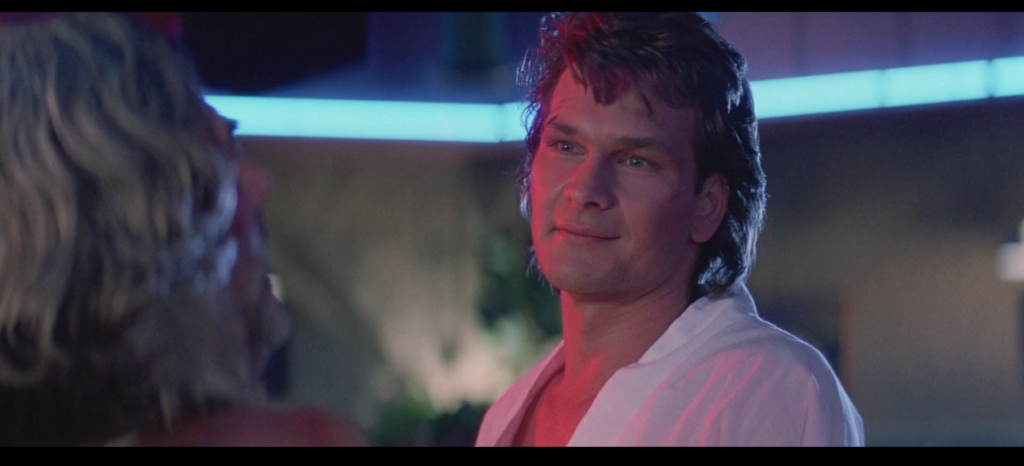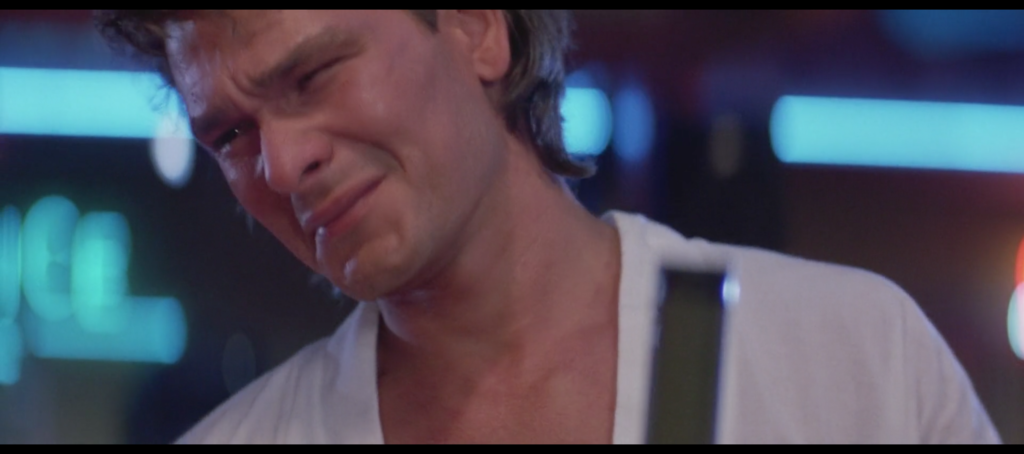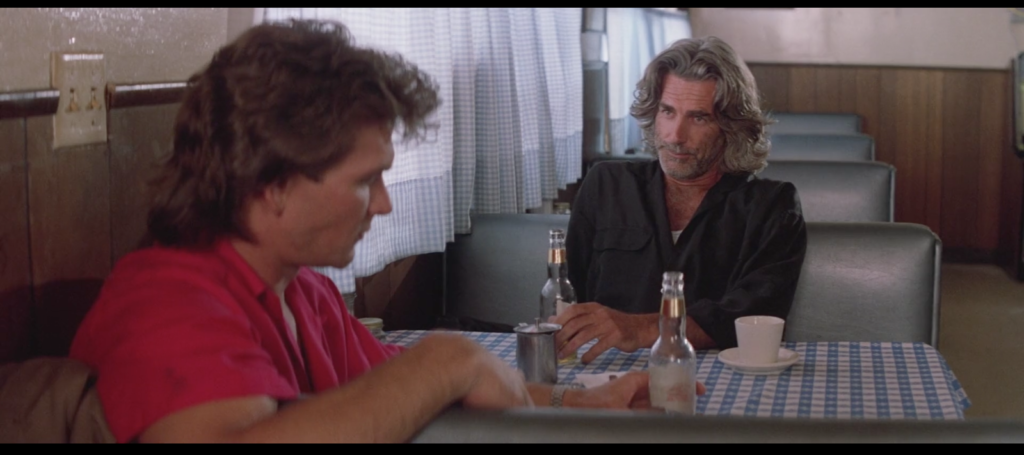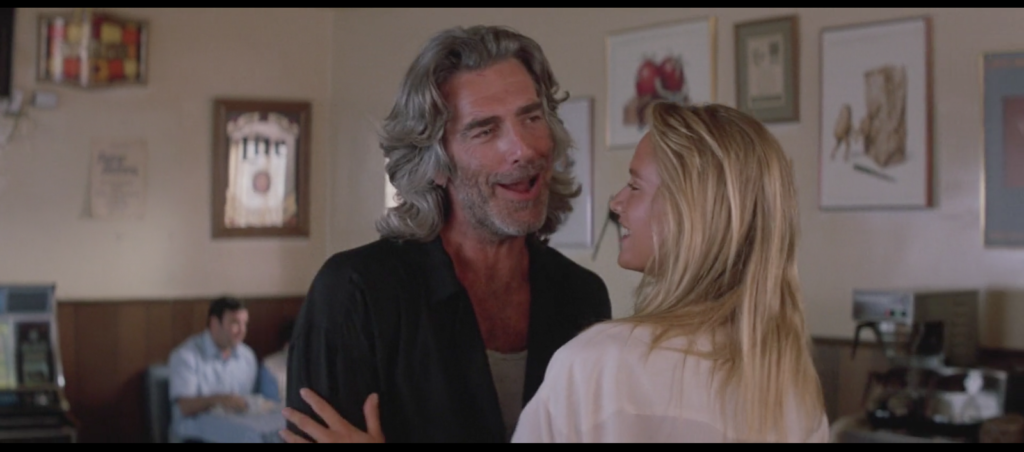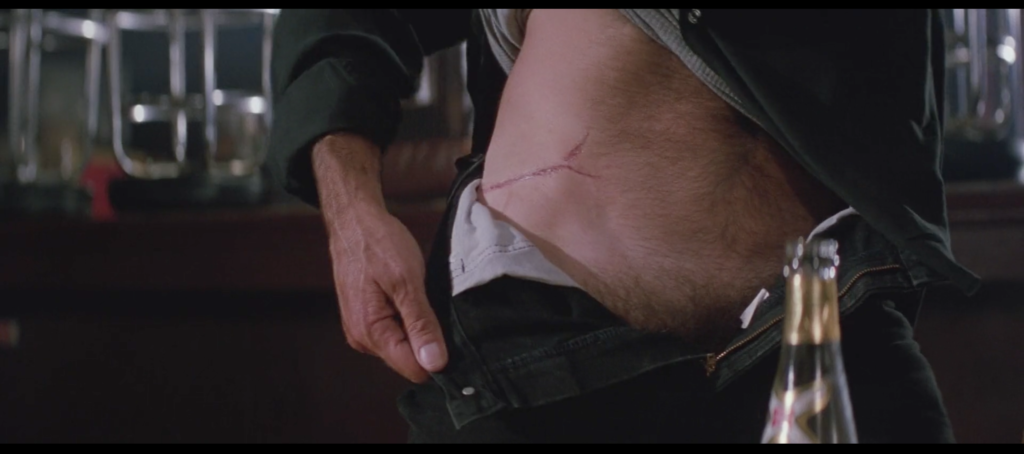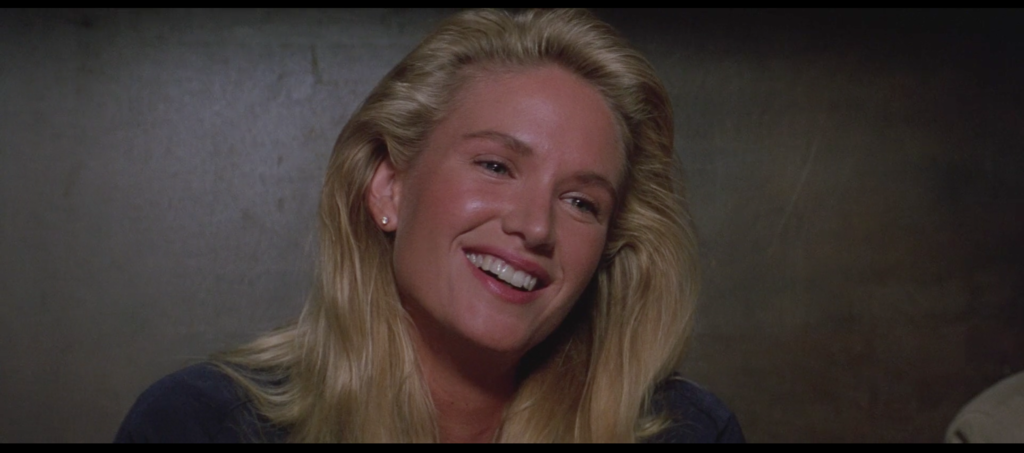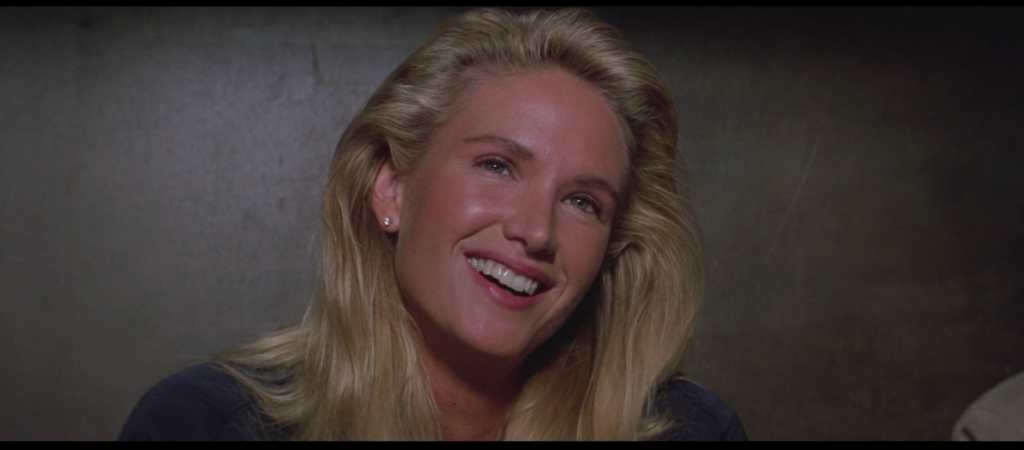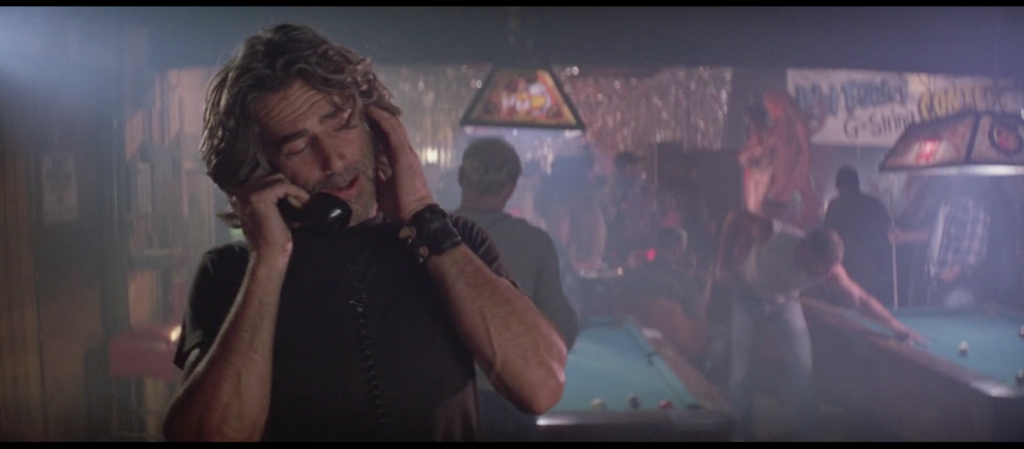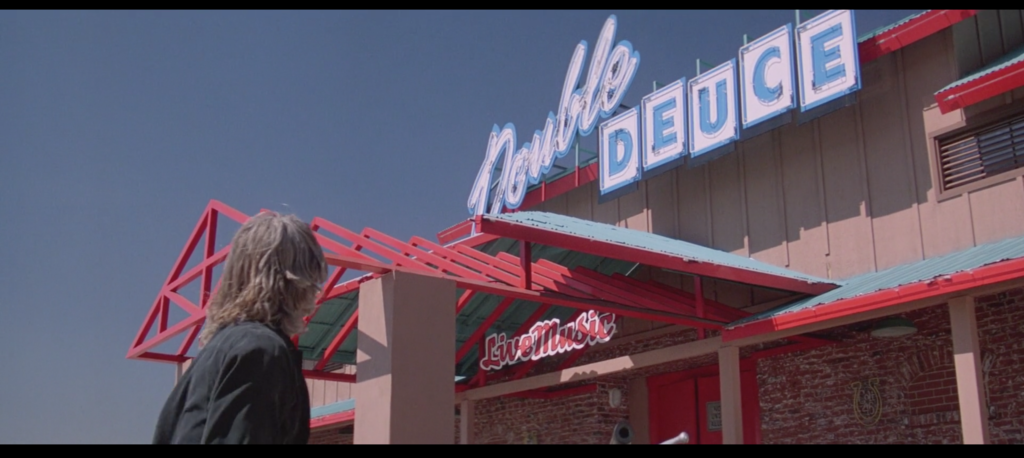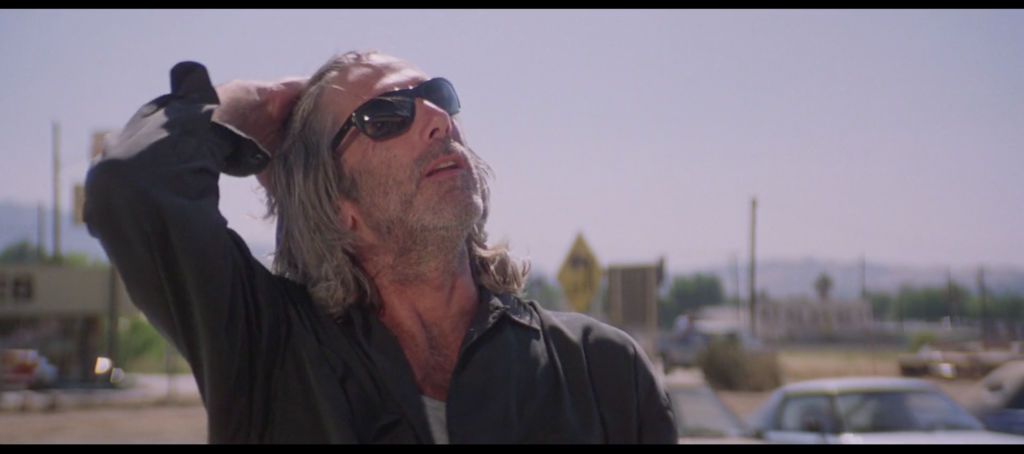Posts Tagged ‘sam elliott’
323. Sublime/Faces of Death Redux
November 19, 2019I sometimes think of Road House as a sublime movie, and that’s not an adjective I throw around for movies that often. For me it’s reserved for films that transport me into a place of tangible, physical awe—the equivalent of musical frisson, that chill you get up and down your spine and through your skull from art that stuns you. If you know me at all it won’t surprise you to learn that I get this feeling most often from horror films. I think Jaws is sublime. I think The Exorcist is sublime. I think The Shining is sublime. I think Aliens is sublime. I think Hereditary is sublime. I think Barton Fink is sublime. You get the idea. So you get that Road House does not transport me the way any of those movies do.
Why is Road House sublime? Because sandwiched in between two identical parking scenes and a scene in which two lovers confront one another over matters of life and death in front of a bunch of x-rays of people’s colons, Patrick Swayze looks at Sam Elliot like he does above and below. First: total love, respect, humility—he is admitting he was wrong after all—and above all gratitude that he gets to know this man. Then: total loss, grief, anger, denial, anything but acceptance that this man who meant so much to him is gone.
The word I use to describe Patrick Swayze as an actor is generous. He gave himself over to this absurd role in this absurd film, used every ounce of his training as an actor and a professional-grade stuntman and a professional-grade ballet dancer. Every interview I’ve ever seen with Kelly Lynch or Marshall Teague or Sam Elliott in which they’re asked about this film is full of superlatives of how dedicated he was, and how kind he was, and how the experience of working with him was…well, they don’t say it, but I will: sublime.
Parking, acting, colons, parking, more acting, acting like his life has fallen apart, like the person he loves most in the world has been stolen from him. His eyes squint with tears and she shakes his head wildly back and forth, moving his whole upper body at one point, his whole self one gigantic No. Some of the dumbest filmmaking I’ve ever seen, and then this. Sublime.
234. Hands full
August 22, 2019Right after Wade Garrett establishes that Dr. Elizabeth Clay has a level of intelligence too lofty to support a kiester of such magnificence, he slides back to a full upright and locked position and says to Dalton, “You’ve got your hands full, kid.” In any other movie I might not assume this was a deliberate double entendre, but in any other movie I wouldn’t have heard the phrase “balls big enough to come in a dump truck.” At the very least Wade is speaking both metaphorically and literally about what Dalton’s hands are full of.
So let us assume this is crude wordplay. What does Wade mean by connecting the mind with the body in this fashion? Might not the meaning of the phrase derive from implication rather than connection? Somewhere in the combination of the Doc’s sparkling intelligence and surpassing beauty there lies what we might call her soul, her chi, her life force, the thing that makes her her. More than being outwitted or banged into oblivion, Dalton is at risk of being trampled by the wild horse energy Wade himself has been attempting to gentle all night. In his own macho way he’s saying the whole is greater than the sum of her parts.
233. Yee-haw!
August 21, 2019As if he’s conducting a stress test of his own sexiness in order to locate the precise point at which he goes from “Ooh, who’s that guy?” to “Ugh, it’s that guy,” Wade Garrett lets out a teensy little “Yee-haw!” while dancing with Dr. Elizabeth Clay. They’re doing a country-western two-step (the actors took lessons of their own volition), and Wade is singing along to the chorus of George Strait’s throwback classic “All My Ex’s Live in Texas,” and then out it comes, an airy falsetto version of the signature yokel yodel. It sounds like the kind of voice you use when you make one of your pets talk. It sounds like Mr. Hanky from South Park. It sounds like the polar opposite of the gravelly baritone we’ve come to know and love from Mr. Sam Elliott, everybody’s cowboy daddy. But note the reaction from the Doc: a breathy laugh, probably imperceptible if you’re more than a couple feet away from her, but eminently perceptible if you’re her gentleman dance partner. Congratulations: You’ve done the dorkiest thing imaginable, and made a woman laugh the way she might if she were particularly delighted by the way you kiss her neck. The Way of Wade Garrett is circuitous, but you can bet there’s a cold beer and a satisfied woman at the end of it every time.
230. Sam Elliott’s pubic hair
August 18, 2019It takes a bold film to remake the Jaws scar comparison/USS Indianapolis story scene as an excuse for Sam Elliott to expose his pubic hair to the viewing public. Road House is a bold film. We’re less than a minute into Wade Garrett reminiscing about a time in Albuquerque, New Mexico, 1975, when he and Dalton got jumped by a guy with a bottle of Jack Daniels aimed at their heads. All it takes is for Dalton to mention the word “scar,” and before you can say Jack Robinson Wade is unbuttoning his jeans. “Oh, I’ll show you a scar,” he says, looking at Dr. Elizabeth Clay, whom he met a couple of hours ago. “I’ll show you one I’m real sentimental about, Doc.” Pop, zip, pull, push push in the bush. It happens as fast as a throat rip. Now even that bottle of Miller seems lewd.
What does the good Doctor think of all this?
You tell me.
I mean Jesus, her attraction to this man could not be more obvious if she stood up and unbuttoned her jeans. If I were Dalton I would not leave these two alone for a minute. If I were Dalton I’d reconsider introducing the two of them in the first place. Even when she asks about the origin of the scar—Her: “A woman?” Him: “Boy, was she.”—her mind is clearly and necessarily on the thought of a woman touching him mere inches away from his penis. Something tells me she’s mentally covered that gap once or twice already.
Kelly Lynch has spoken sweetly about her romantic chemistry with both Patrick Swayze and Sam Elliott in this film, and the highest compliment I can pay her is that I didn’t need to hear her explain it. It’s right there on the screen. She looks at Sam Elliott’s pubic hair the same way most women I’ve watched this movie with do. A man? Boy, was he.
118. Aw Shit Hell Kid
April 28, 2019I hate to do this to Terry Funk of all people—it’s still real to me, dammit!—but Sam Elliott is here to take the Mispronunciation Title right out of his hands. Watching and hearing Wade Garrett talk to Dalton is fascinating for at least six posts’ worth of reasons, but the adventure of listening to him go to work on the English language is right there at the top. When Dalton asks him how he’s doing, he replies “Aw Shit Hell Kid I’m in Hog Heaven,” and it sounds like it reads there—like he’s reciting a song title he’s never come across before but thinks is pretty funny now that he’s seeing it for the first time. He closes out the call by telling Dalton “I’ll see ya later,” but not as one sentence, no, that would be the easy way out, and Wade Garrett is made of sterner stuff. “I’ll see ya,” he says, then pauses, then adds, “Later.” I’ve told people “See ya,” and I’ve told people “Later,” but never have I done so back to back. No one has done so back to back, until now. Sam Elliott decided he was gonna have some fun with the line “I’ll see ya later” and Rowdy Herrington had the good sense to let him, just as he did when Terry Funk got creative with “You’re a dead man.” People talk about Scorsese and De Niro and “You talkin’ to me?” or the tears in rain speech from Blade Runner, but real heads know.
017. The Double Douche
January 17, 2019Dalton has worked at the Double Deuce for a while now, and business is booming. The place is packed every night. The bartenders and bouncers wear jaunty red shirts as uniforms. The band is out from behind the chickenwire. The facade has been remodeled to look like a place the gang from Saved by the Bell might visit. There’s just one problem: Brad Wesley has cut off the liquor supply. Dalton, an excellent cooler but not the most excellent cooler, knows this is no job for one man. He makes a call. (He has sex with the Doc.) Then, as Dalton requested, Wade Garrett arrives. Senpai has noticed him.
Wade Garrett is played by Sam Elliott, and what you’re picturing is almost what you get. The voice is there. The sense that you’re looking at a person who’s more beef jerky than man is there. But this isn’t the fine upstanding cowboy who wishes the Dude wouldn’t use so many cusswords. (Nor even the actual pitchman for beef.) Wade Garrett is a bit dangerous, a bit sleazy, a lot sexy. “Louche” might cover it.
So when Wade Garrett pulls up on his motorcycle, he doesn’t so much dismount the bike as ooze off of it. You can all but hear his bowlegs creak and stretch, smell his two-day post-shower aroma spiked with cigarette smoke and exhaust fumes and hot asphalt, feel him adjust his hips to ensure he’s doglegging in the proper direction within those skinny black jeans.
Wade Garrett looks up at the Giuliani Times Square marquee Frank Tilghman has erected over the former dive bar where young Dalton works, runs his hand over his greasy gray hair, and reads the name aloud: “The Double Douche.” [Sic.]
Why does he pronounce it this way? On one level I assume it’s a tip of the hat to the all-time god-emperor of pronouncing “deuce” as “douche,” Manfred Mann’s Earth Band’s version of the early Bruce Springsteen composition “Blinded by the Light.” Wade does have his shades on, and it is very bright out.
But it’s more than that. It’s a demonstration of Wade’s contempt for anything but the work of cooling itself. You can wrap it up like a Deuce, or a Douche if you will, but beating up the people who beat other people is what he’s here for. No delusions, no pretensions. He came to fight. To quote the man himself when he’s asked “Are you gonna fight, dickless?” a couple minutes later, “I sure ain’t gonna show you my dick.”
And it’s a signal that whatever his affection for his protégé Dalton, he shares little of the younger man’s philosophical outlook. It’s hard to imagine Wade Garrett telling anyone that being called a cocksucker is just “two nouns combined to elicit a prescribed response.” Wade is too much of the wild man, too much the heir to Mifune in Seven Samurai. Wade’s world is one of George Carlin’s seven words, several of which he lets fly before his untimely demise. It’s a world of sweat and blood and sexual fluids. Those are things he understands. Those are things he treasures.
This is not to say that Dalton is a slacker in any of those departments—far from it. It’s just that he maintains a certain detachment from it all. Not so Wade. He’ll pull his sidekick’s ass out of the fire one minute and compliment his sidekick’s girlfriend’s ass the next. He’ll show a woman he just met his pubic hair in order to reveal a wound incurred from a previous woman who was presumably well acquainted with his pubic hair before things went south, so to speak.
Speaking of bad breakups, the horrible crime of passion that haunts Dalton? Wade blames the woman whose husband Dalton murdered with his bare hands more than Dalton himself on account of her never revealing her marital status, and sees it as a simple matter of kill or be killed. Yet he’ll expose intense feelings like that only when pushed by the man closest to him, Dalton himself. Otherwise Wade Garrett is, as Billy Joel would put it, quick with a joke or to light up your smoke. He’s still cracking wise the last time we see him alive, after he’s been beaten half to death.
Put succinctly, Wade Garrett the type of guy to ride hundreds of miles to the rescue of his best friend, then make a sophomoric douche joke when he arrives. There are many ways to be an itinerant bouncer-sage in this world. The path of Wade Garrett is but one, as valid as any other.

